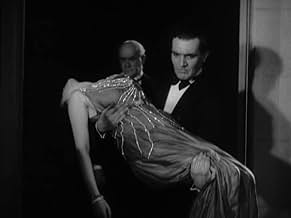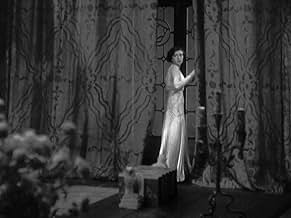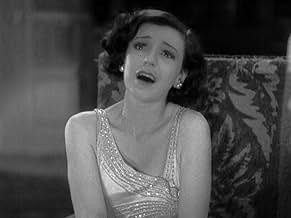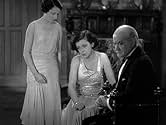AVALIAÇÃO DA IMDb
5,7/10
3,8 mil
SUA AVALIAÇÃO
Uma antiga família tradicional e uma família moderna lutam por terras em uma pequena vila inglesa e acabam quase se destruindo uns aos outros.Uma antiga família tradicional e uma família moderna lutam por terras em uma pequena vila inglesa e acabam quase se destruindo uns aos outros.Uma antiga família tradicional e uma família moderna lutam por terras em uma pequena vila inglesa e acabam quase se destruindo uns aos outros.
- Direção
- Roteiristas
- Artistas
Rodney Ackland
- Man at Auction
- (não creditado)
Ivor Barnard
- Man at Auction
- (não creditado)
Wally Patch
- Van Driver
- (não creditado)
- Direção
- Roteiristas
- Elenco e equipe completos
- Produção, bilheteria e muito mais no IMDbPro
Avaliações em destaque
I recently saw Hitchcock's "Rich and Strange" and really enjoyed it, so I was game for another go at this early 1930's British cinema, in my attempt to become a "Hitchcock completist." Please keep in mind that I'm an American with a pretty-good ear for British dialog, but there are some speeches contained here that I couldn't understand in the least. But only a fairly small portion that is. The early sound equipment doesn't help either.
The title "The Skin Game" refers to a heated altercation that leaves no holds barred, and no prisoners taken. The plot line is essentially a "Hatfields and McCoys" family feud over land rights, with a lot of dirt being dug up on both families involved. Like pretty much all early sound films, there is a heavy reliance on dialog and the spoken phrase, which makes "The Skin Game" obviously derived from the stage.
At the beginning there's a long take with probably ten pages of dialog in it, using a medium shot of three characters, with the camera panning between them. At least once, someone was speaking dialog while not on camera, which I always find distracting -- a minor flaw I admit, but noticeable. Hitchcock's pacing feels relatively quick considering, and he keeps interest in these scenes with dramatic exits and entrances of characters, and revelations of plot details.
Really some of these takes were so long that actors coughed, dropped things and retrieved them, and other apparent flubs that were never re-shot. Seems like once the director was five minutes into a scene he couldn't afford the film stock to begin again, so there are a lot of miscues and such, which kind of adds to the immediacy. Especially considering that I'm certain that even the young Hitchcock was keenly aware of every missed cue and dropped line, and it had to drive him to distraction! I was certainly impressed by this early Hitchcock effort and I'm sure that audiences back then went away from this one with the feeling that they got their money's worth. It was apparent that an extremely talented film maker was at work here, trying to keep the audience involved every step of the way. And he did succeed actually.
For instance, there is a scene at an auction house that lasts for about ten minutes, and Hitchcock sets it up in such a way to keep the audience anxiously awaiting the outcome. He has the camera making very fast pans from one bidder to the next, slowing down only when the bidding does. The audience has some background information about the proceedings, but not enough to spoil the surprise at the end.
It's early sound cinema -- so most viewers today can't bear this kind of thing, but if you're familiar with and enjoy films of the early 20Th Century, it's extremely enjoyable and does have a payoff at the end! *** out of *****
The title "The Skin Game" refers to a heated altercation that leaves no holds barred, and no prisoners taken. The plot line is essentially a "Hatfields and McCoys" family feud over land rights, with a lot of dirt being dug up on both families involved. Like pretty much all early sound films, there is a heavy reliance on dialog and the spoken phrase, which makes "The Skin Game" obviously derived from the stage.
At the beginning there's a long take with probably ten pages of dialog in it, using a medium shot of three characters, with the camera panning between them. At least once, someone was speaking dialog while not on camera, which I always find distracting -- a minor flaw I admit, but noticeable. Hitchcock's pacing feels relatively quick considering, and he keeps interest in these scenes with dramatic exits and entrances of characters, and revelations of plot details.
Really some of these takes were so long that actors coughed, dropped things and retrieved them, and other apparent flubs that were never re-shot. Seems like once the director was five minutes into a scene he couldn't afford the film stock to begin again, so there are a lot of miscues and such, which kind of adds to the immediacy. Especially considering that I'm certain that even the young Hitchcock was keenly aware of every missed cue and dropped line, and it had to drive him to distraction! I was certainly impressed by this early Hitchcock effort and I'm sure that audiences back then went away from this one with the feeling that they got their money's worth. It was apparent that an extremely talented film maker was at work here, trying to keep the audience involved every step of the way. And he did succeed actually.
For instance, there is a scene at an auction house that lasts for about ten minutes, and Hitchcock sets it up in such a way to keep the audience anxiously awaiting the outcome. He has the camera making very fast pans from one bidder to the next, slowing down only when the bidding does. The audience has some background information about the proceedings, but not enough to spoil the surprise at the end.
It's early sound cinema -- so most viewers today can't bear this kind of thing, but if you're familiar with and enjoy films of the early 20Th Century, it's extremely enjoyable and does have a payoff at the end! *** out of *****
Early Hitchcock drama that proves with every film, he was experimenting. Here, he uses zip pans moving from person to person during a frantic auction scene. This technique wouldn't become commonplace for another thirty years with the introduction of cinema verite. Other than that, this is a rather ordinary drama.
... but it is an adequate way to explain the dynamic for Americans.
Alfred Hitchcock directs this adaptation of John Galsworthy's play. The moneyed, cultured Hillcrists battle against the nouveau riche Hornblowers, the latter headed by the ambitious, combative patriarch (Edmund Gwenn). Their squabbles over the use of farm land for industrial purposes ends up causing heartache and tragedy for both families. Featuring C. V. France, Helen Haye, and Jill Esmond as the Hillcrists, and John Longden, Phyllis Konstam, and Frank Lawton as the other Hornblowers. With Herbert Ross, Dora Gregory, and Edward Chapman.
This had already been filmed (also with Gwenn) in 1921. The class-conscious storyline resonated well with the British, I suppose. Gwenn plays his role big, and is a stark contrast to his later, best-known Kris Kringle role in Miracle on 34th Street. Jill Esmond, the first wife of Laurence Olivier and originally the bigger star in the marriage, has one of her better film roles. As for Hitchcock's direction, the only stand-out scene is a lengthy auction with a lot of rapid-cut edits.
Alfred Hitchcock directs this adaptation of John Galsworthy's play. The moneyed, cultured Hillcrists battle against the nouveau riche Hornblowers, the latter headed by the ambitious, combative patriarch (Edmund Gwenn). Their squabbles over the use of farm land for industrial purposes ends up causing heartache and tragedy for both families. Featuring C. V. France, Helen Haye, and Jill Esmond as the Hillcrists, and John Longden, Phyllis Konstam, and Frank Lawton as the other Hornblowers. With Herbert Ross, Dora Gregory, and Edward Chapman.
This had already been filmed (also with Gwenn) in 1921. The class-conscious storyline resonated well with the British, I suppose. Gwenn plays his role big, and is a stark contrast to his later, best-known Kris Kringle role in Miracle on 34th Street. Jill Esmond, the first wife of Laurence Olivier and originally the bigger star in the marriage, has one of her better film roles. As for Hitchcock's direction, the only stand-out scene is a lengthy auction with a lot of rapid-cut edits.
....this is good early Hitch! good screenplay,good directing and good acting!Phyllis Konstam is the stand-out .Her portrayal of Chloé can still grab today's audience .
Good scenes:
-the auction sale,twenty-eight years before "North by Norwest" ,is one of the most suspenseful moments of the Master's English era.And there's a brilliant unexpected twist when we think it's over!
-when Chloe takes refuge in her father-in-law's enemy's house,the things seem to have a life of their own:the door,the window,the curtains..
And in 1931,Hitchcock avoids over-simplification:who is good,in the end?who is evil?The local squire and his lady or the arrogant nouveau riche?Who did you have to save?the old couple or the ill-fated Chloé?
In the Truffaut/Hitchcock book,the master says "I did not choose that subject and there is nothing to say about it."
Good scenes:
-the auction sale,twenty-eight years before "North by Norwest" ,is one of the most suspenseful moments of the Master's English era.And there's a brilliant unexpected twist when we think it's over!
-when Chloe takes refuge in her father-in-law's enemy's house,the things seem to have a life of their own:the door,the window,the curtains..
And in 1931,Hitchcock avoids over-simplification:who is good,in the end?who is evil?The local squire and his lady or the arrogant nouveau riche?Who did you have to save?the old couple or the ill-fated Chloé?
In the Truffaut/Hitchcock book,the master says "I did not choose that subject and there is nothing to say about it."
Technical crudities, print/sound deficiencies and dated acting styles taken into consideration, "Skin Game" still has innovative (for the time) camera techniques and thematic ambiguity (who is right and who is wrong? Who are the true villains of the story?) and is generally better than other, more "typical" Hitchcock films of the period, like "Murder!" from 1930.Edmund Gwenn is terrific and Phyllis Constam is quite sexy. (**1/2)
Você sabia?
- CuriosidadesThe title comes from a slang phrase for "an unscrupulous business operation". Although this movie is British, the term is considered American and dates back to just after the American Civil War (1861-1865). It is not to be confused with the similar-sounding aphorism "to have skin in the game", which refers to someone who has a stake, financial or emotional, in a business deal, wager, or other situation.
- Citações
[last lines]
Mr. Hillcrist: What is it that gets loose when you start a fight, and makes you what you think you're not? Begin as you may, it ends in this skin game! Skin game! When we began this fight, we'd clean hands. Are they clean now? What's gentility worth if it can't stand fire?
- ConexõesFeatured in Paul Merton Looks at Alfred Hitchcock (2009)
- Trilhas sonorasHabanera
(1875) (uncredited)
from "Carmen"
Music by Georges Bizet
Libretto by Henri Meilhac and Ludovic Halévy
Excerpt whistled by Jill Esmond
Principais escolhas
Faça login para avaliar e ver a lista de recomendações personalizadas
Detalhes
- Data de lançamento
- País de origem
- Idioma
- Também conhecido como
- The Skin Game
- Locações de filme
- Elstree Studios, Borehamwood, Hertfordshire, Inglaterra, Reino Unido(Studio, destroyed during World War II and later rebuilt)
- Empresa de produção
- Consulte mais créditos da empresa na IMDbPro
- Tempo de duração
- 1 h 25 min(85 min)
- Cor
Contribua para esta página
Sugerir uma alteração ou adicionar conteúdo ausente
































